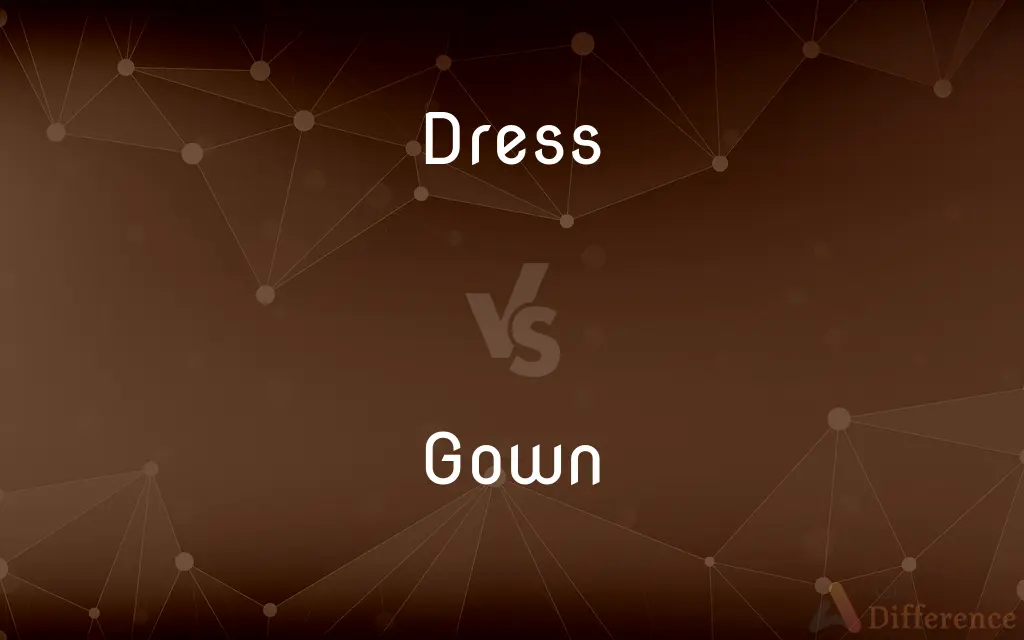Dress vs. Gown — What's the Difference?
By Tayyaba Rehman & Urooj Arif — Updated on March 8, 2024
A dress is versatile daily wear, while a gown is often formal or ceremonial.

Difference Between Dress and Gown
Table of Contents
ADVERTISEMENT
Key Differences
A dress typically refers to a one-piece garment for women or girls that covers the body and extends down over the legs, suitable for a wide range of occasions from casual to semi-formal. Whereas a gown is a more formal or elegant dress, often floor-length, worn for special occasions like weddings, galas, and formal events.
Dresses come in various styles, lengths, and designs, catering to everyday wear and less formal events. On the other hand, gowns are characterized by their elaborate designs, luxurious fabrics, and intricate details, making them ideal for formal gatherings and ceremonies.
While dresses can be made from a variety of materials including cotton, polyester, and wool, suitable for all seasons, gowns are often made from high-quality, luxurious materials such as silk, satin, and velvet, emphasizing their elegance and formality.
Dresses offer practicality and comfort, often designed to be lightweight and suitable for daily activities. In contrast, gowns may prioritize aesthetic appeal over comfort, with some designs incorporating corsets, long trains, or heavy embellishments that can be restrictive.
In terms of accessorizing, dresses can be easily paired with simple accessories for a casual look or dressed up with more sophisticated jewelry and shoes for a semi-formal appearance. Meanwhile, gowns typically require more elaborate accessories, such as fine jewelry and elegant footwear, to complement their formal nature.
ADVERTISEMENT
Comparison Chart
Formality
Ranges from casual to semi-formal
Typically formal or ceremonial
Occasion
Daily wear, casual outings, semi-formal events
Weddings, galas, formal events, ceremonies
Length
Can be short, midi, or long
Often floor-length
Material
Varied, including cotton, polyester, wool
Luxurious materials like silk, satin, velvet
Design Focus
Practicality and versatility
Elegance, elaborate designs, intricate details
Compare with Definitions
Dress
A one-piece garment for women or girls that covers the body and extends over the legs.
She wore a floral dress to the picnic.
Gown
Typically features luxurious fabrics and intricate details.
The silk gown shimmered under the ballroom lights.
Dress
Can be designed for various occasions, from casual to formal.
Her cocktail dress was perfect for the evening event.
Gown
A formal or elegant dress, often floor-length, worn on special occasions.
She selected a stunning gown for the gala.
Dress
Often emphasizes comfort and practicality.
She chose a lightweight dress for the hot summer day.
Gown
May include specific styles like ball gowns or evening gowns.
Her ball gown made her feel like royalty at the event.
Dress
Styles can range widely, from shift to wrap dresses.
Her wrap dress accentuated her figure beautifully.
Gown
Less focused on practicality, more on aesthetic appeal.
The gown's long train added a dramatic flair to her look.
Dress
Accessories can vary based on the dress's formality.
She added a belt to her dress for a touch of sophistication.
Gown
Often accessorized with fine jewelry and elegant footwear.
Diamond earrings complemented her velvet gown perfectly.
Dress
A dress (also known as a frock or a gown) is a garment traditionally worn by women or girls consisting of a skirt with an attached bodice (or a matching bodice giving the effect of a one-piece garment). It consists of a top piece that covers the torso and hangs down over the legs.
Gown
A gown, from the Saxon word, gunna, is a usually loose outer garment from knee- to full-length worn by men and women in Europe from the Early Middle Ages to the 17th century, and continuing today in certain professions; later, gown was applied to any full-length woman's garment consisting of a bodice and attached skirt. A long, loosely fitted gown called a Banyan was worn by men in the 18th century as an informal coat.
Dress
Put on one's clothes
Graham showered and dressed quickly
I'll go and get dressed
Gown
A long elegant dress worn on formal occasions
A silk ball gown
Dress
Decorate (something) in an artistic or attractive way
She'd enjoyed dressing the tree when the children were little
Gown
Be dressed in a gown
She was gowned in luminous silk
Dress
Treat or prepare (something) in a certain way.
Gown
A long loose flowing garment, such as a robe or nightgown.
Dress
Draw up (troops) in the proper alignment.
Gown
A long, usually formal dress.
Dress
(of a man) have the genitals habitually on one or the other side of the fork of the trousers
Do you dress to the left?
Gown
A robe or smock worn in operating rooms and other parts of hospitals as a guard against contamination.
Dress
Make (an artificial fly) for use in fishing
After you dress a dry fly, be sure to remove any oil before you make your next cast
Gown
A distinctive outer robe worn on ceremonial occasions, as by scholars or clerics.
Dress
A one-piece garment for a woman or girl that covers the body and extends down over the legs
A dress designer
A white cotton dress
Gown
The faculty and student body of a university
Perfect accord between town and gown.
Dress
Clothing of a specified kind for men or women
Traditional African dress
Gown
To clothe (oneself or another) with a gown.
Dress
To put clothes on; clothe.
Gown
A loose, flowing upper garment.
Dress
To furnish with clothing.
Gown
A woman's ordinary outer dress, such as a calico or silk gown.
Dress
To decorate or adorn
Dress a Christmas tree.
Gown
The official robe of certain professionals, clerics, and scholars, such as university students and officers, barristers, judges, etc.
Dress
To garnish
Dressed the side dish with parsley.
Gown
The dress of civil officers, as opposed to military officers.
Dress
To arrange a display in
Dress a store window.
Gown
(by metonymy) The university community, especially as contrasted with the local populace.
In the perennial town versus gown battles, townies win some violent battles, but the collegians are winning the war.
Dress
To arrange (troops) in ranks; align.
Gown
A loose wrapper worn by gentlemen within doors; a dressing gown.
Dress
To apply medication, bandages, or other therapeutic materials to (a wound).
Gown
Any sort of dress or garb.
Dress
To arrange and groom (the hair), as by styling, combing, or washing.
Gown
The robe worn by a surgeon.
Dress
To groom (an animal); curry.
Gown
To dress in a gown, to don or garb with a gown.
Dress
To fertilize (land or plants).
Gown
A loose, flowing upper garment
He Mars deposed, and arms to gowns made yield.
Dress
(Archaic) To cultivate (land or plants).
Gown
A loose wrapper worn by gentlemen within doors; a dressing gown.
Dress
To clean (fish or fowl) for cooking or sale.
Gown
Any sort of dress or garb.
He comes . . . in the gown of humility.
Dress
To put a finish on (stone or wood, for example).
Gown
Long, usually formal, woman's dress
Dress
To tan or prepare (a hide) in leather-making.
Gown
Protective garment worn by surgeons during operations
Dress
To put on clothes.
Gown
Outerwear consisting of a long flowing garment used for official or ceremonial occasions
Dress
To wear clothes of a certain kind or style
Dresses casually.
Gown
Dress in a gown
Dress
To wear formal clothes
Dress for dinner.
Dress
To get into proper alignment with others
The troops dressed on the squad leader.
Dress
Clothing; apparel.
Dress
A style of clothing
Folk dancers in peasant dress.
Dress
A one-piece outer garment consisting of a skirt and bodice.
Dress
Outer covering or appearance; guise
An ancient ritual in modern dress.
Dress
Suitable for formal occasions
Dress shoes.
Dress
Requiring formal clothes
A dress dinner.
Dress
(transitive)
Dress
To put clothes (or, formerly, armour) on (oneself or someone, a doll, a mannequin, etc.); to clothe.
He was dressed in the latest fashions.
Dress
To design, make, provide, or select clothes (for someone).
The fashion designer was proud to have dressed the queen for the charity event.
Dress
To arrange or style (someone's hair).
Dress
To adorn or ornament (something).
It was time to dress the windows for Christmas again.
Dress
To apply a dressing to or otherwise treat (a wound); (obsolete) to give (a wounded person) medical aid.
Dress
To fit or prepare (something) for use; to render (something) suitable for an intended purpose; to get ready.
In mining and metallurgy, to dress ores by sorting and separating them
Dress
To cultivate or tend to (a garden, land, plants, etc.); especially, to add fertilizer or manure to (soil); to fertilize, to manure.
Dress
(cooking) To prepare (food) for cooking or eating, especially by seasoning it; specifically, to add a dressing or sauce (to food, especially a salad).
Dress
(military) To arrange (soldiers or troops) into proper formation; especially, to adjust (soldiers or troops) into straight lines and at a proper distance from each other; to align.
To dress the ranks
Dress
To treat (someone) in a particular manner; specifically, in an appropriate or fitting manner; to give (someone) a deserved beating; also, to give (someone) a good scolding; to dress down.
Dress
(obsolete) To break in and train (a horse or other animal) for use.
Dress
To prepare (oneself); to make ready.
Dress
(intransitive)
Dress
To put on clothes.
Get dressed
I rose and dressed before daybreak.
It’s very cold out. Dress warm.
Dress
Of a thing: to attain a certain condition after undergoing some process or treatment to fit or prepare it for use.
Dress
To allow one's penis to fall to one side or the other within one's trousers.
While measuring him for his trousers, the tailor asked him if he dressed to the left or the right.
Dress
(slang) cross-dress
Dress
Of an animal carcass: to have a certain quantity or weight after removal of the internal organs and skin; also, to have a certain appearance after being cut up and prepared for cooking.
Dress
Of soldiers or troops: to arrange into proper formation; especially, to form into straight lines and at a proper distance from each other.
Dress
(sports) Of a sportsperson: to put on the uniform and have the equipment needed to play a sport.
Due to a left ankle sprain, the basketball player did not dress for the game against Indiana.
Dress
(countable)
Dress
An item of clothing (usually worn by a woman or young girl) which both covers the upper part of the body and includes a skirt below the waist.
Amy and Mary looked very pretty in their dresses.
Dress
Ellipsis of dress rehearsal
Dress
(uncountable)
Dress
Apparel or clothing, especially when appropriate for a particular occasion, profession, etc.
Military dress
He came to the party in formal dress.
Dress
(archaic) The act of putting on clothes, especially fashionable ones, or for a particular (especially formal) occasion.
Dress
(by extension)
Dress
(obsolete) The act of applying a dressing to or otherwise treating a wound; also, the dressing so applied.
Dress
To direct; to put right or straight; to regulate; to order.
At all times thou shalt bless God and pray Him to dress thy ways.
To Grisild again will I me dresse.
Dress
To arrange in exact continuity of line, as soldiers; commonly to adjust to a straight line and at proper distance; to align; as, to dress the ranks.
Dress
To treat methodically with remedies, bandages, or curative appliances, as a sore, an ulcer, a wound, or a wounded or diseased part.
Dress
To adjust; to put in good order; to arrange; specifically: (a) To prepare for use; to fit for any use; to render suitable for an intended purpose; to get ready; as, to dress a slain animal; to dress meat; to dress leather or cloth; to dress or trim a lamp; to dress a garden; to dress a horse, by currying and rubbing; to dress grain, by cleansing it; in mining and metallurgy, to dress ores, by sorting and separating them.
And the Lord God took the man, and put him into the garden of Eden to dress it.
When he dresseth the lamps he shall burn incense.
Three hundred horses . . . smoothly dressed.
Dressing their hair with the white sea flower.
If he felt obliged to expostulate, he might have dressed his censures in a kinder form.
Dress
To cut to proper dimensions, or give proper shape to, as to a tool by hammering; also, to smooth or finish.
Dress
To put in proper condition by appareling, as the body; to put clothes upon; to apparel; to invest with garments or rich decorations; to clothe; to deck.
Dressed myself in such humility.
Prove that ever Idress myself handsome till thy return.
Dress
To break and train for use, as a horse or other animal.
Dress
To arrange one's self in due position in a line of soldiers; - the word of command to form alignment in ranks; as, Dress right, dress!
Dress
To clothe or apparel one's self; to put on one's garments; to pay particular regard to dress; as, to dress quickly.
To flaunt, to dress, to dance, to thrum.
Dress
That which is used as the covering or ornament of the body; clothes; garments; habit; apparel.
Dress
A lady's gown; as, silk or a velvet dress.
Dress
The system of furrows on the face of a millstone.
Dress
A one-piece garment for a woman; has skirt and bodice
Dress
Clothing of a distinctive style or for a particular occasion;
Formal attire
Battle dress
Dress
Clothing in general;
She was refined in her choice of apparel
He always bought his clothes at the same store
Fastidious about his dress
Dress
Put on clothes;
We had to dress quickly
Dress the patient
Can the child dress by herself?
Dress
Provide with clothes or put clothes on;
Parents must feed and dress their child
Dress
Put a finish on;
Dress the surface smooth
Dress
Dress in a certain manner;
She dresses in the latest Paris fashion
He dressed up in a suit and tie
Dress
Dress or groom with elaborate care;
She likes to dress when going to the opera
Dress
Arrange in ranks;
Dress troops
Dress
Decorate (food), as with parsley or other ornamental foods
Dress
Provide with decoration;
Dress the windows
Dress
Put a dressing on;
Dress the salads
Dress
Cultivate, tend, and cut back the growth of;
Dress the plants in the garden
Dress
Cut down rough-hewn (lumber) to standard thickness and width
Dress
Convert into leather;
Dress the tanned skins
Dress
Apply a bandage or medication to;
Dress the victim's wounds
Dress
Give a neat appearance to;
Groom the dogs
Dress the horses
Dress
Arrange attractively;
Dress my hair for the wedding
Dress
Suitable for formal occasions;
Formal wear
A full-dress uniform
Dress shoes
Dress
(of an occasion) requiring formal clothes;
A dress dinner
A full-dress ceremony
Common Curiosities
Can a dress be considered a gown?
A dress can be considered a gown if it is designed for formal occasions and has elaborate features.
Are all gowns long?
Most gowns are traditionally long, especially for formal events, but there are exceptions.
Are gowns only for evening events?
While gowns are often associated with evening events, some can be worn for daytime formal occasions.
Can I wear a dress to a formal event?
Yes, a more formal, sophisticated dress can be appropriate for certain formal events.
Are there any dress codes that specifically require a gown?
Yes, dress codes like "white tie" or "black tie" often require gowns for women.
Are gowns only for women?
Traditionally, gowns are women's attire, but there are ceremonial gowns like academic or judicial gowns that men wear.
How do I choose between a dress and a gown for an event?
Consider the event's formality, venue, and time of day; gowns are suited for more formal, evening events.
Can dresses be as expensive as gowns?
Yes, depending on the designer, materials, and details, dresses can be as expensive as gowns.
Do I need to wear special undergarments with a gown?
Depending on the gown's design and fabric, special undergarments may be necessary for the desired silhouette.
Can gowns be worn for semi-formal events?
It depends on the gown's style; simpler gowns can be suitable for semi-formal events.
Is it easier to move around in a dress than in a gown?
Generally, yes, as dresses tend to be less restrictive and lighter than many gowns.
Can a short dress be considered a gown if it's very formal?
Typically, gowns are long, but a very formal, elaborate short dress might be considered a gown in certain contexts.
How do I care for a gown?
Gowns often require special care, such as dry cleaning or careful hand washing, due to their delicate fabrics.
Share Your Discovery

Previous Comparison
Cubicle vs. Cube
Next Comparison
Scrub vs. ScourAuthor Spotlight
Written by
Tayyaba RehmanTayyaba Rehman is a distinguished writer, currently serving as a primary contributor to askdifference.com. As a researcher in semantics and etymology, Tayyaba's passion for the complexity of languages and their distinctions has found a perfect home on the platform. Tayyaba delves into the intricacies of language, distinguishing between commonly confused words and phrases, thereby providing clarity for readers worldwide.
Co-written by
Urooj ArifUrooj is a skilled content writer at Ask Difference, known for her exceptional ability to simplify complex topics into engaging and informative content. With a passion for research and a flair for clear, concise writing, she consistently delivers articles that resonate with our diverse audience.















































